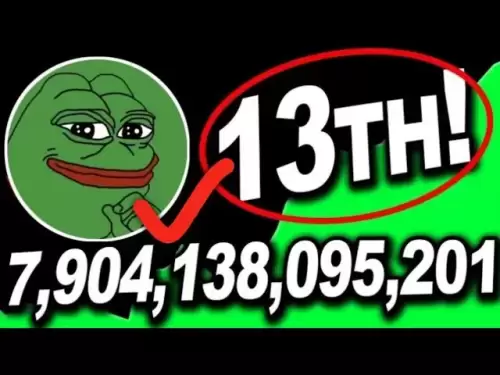-
 Bitcoin
Bitcoin $106,754.6083
1.33% -
 Ethereum
Ethereum $2,625.8249
3.80% -
 Tether USDt
Tether USDt $1.0001
-0.03% -
 XRP
XRP $2.1891
1.67% -
 BNB
BNB $654.5220
0.66% -
 Solana
Solana $156.9428
7.28% -
 USDC
USDC $0.9998
0.00% -
 Dogecoin
Dogecoin $0.1780
1.14% -
 TRON
TRON $0.2706
-0.16% -
 Cardano
Cardano $0.6470
2.77% -
 Hyperliquid
Hyperliquid $44.6467
10.24% -
 Sui
Sui $3.1128
3.86% -
 Bitcoin Cash
Bitcoin Cash $455.7646
3.00% -
 Chainlink
Chainlink $13.6858
4.08% -
 UNUS SED LEO
UNUS SED LEO $9.2682
0.21% -
 Avalanche
Avalanche $19.7433
3.79% -
 Stellar
Stellar $0.2616
1.64% -
 Toncoin
Toncoin $3.0222
2.19% -
 Shiba Inu
Shiba Inu $0.0...01220
1.49% -
 Hedera
Hedera $0.1580
2.75% -
 Litecoin
Litecoin $87.4964
2.29% -
 Polkadot
Polkadot $3.8958
3.05% -
 Ethena USDe
Ethena USDe $1.0000
-0.04% -
 Monero
Monero $317.2263
0.26% -
 Bitget Token
Bitget Token $4.5985
1.68% -
 Dai
Dai $0.9999
0.00% -
 Pepe
Pepe $0.0...01140
2.44% -
 Uniswap
Uniswap $7.6065
5.29% -
 Pi
Pi $0.6042
-2.00% -
 Aave
Aave $289.6343
6.02%
Yang line in the falling channel: How to grasp the oversold rebound?
A Yang line in a falling channel may signal a bullish rebound, especially when confirmed by oversold indicators and increased volume.
Jun 17, 2025 at 10:49 am
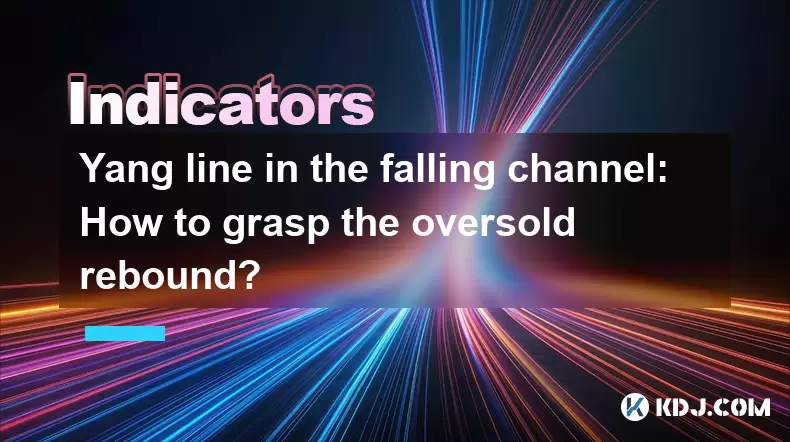
Understanding the Yang Line and Its Role in Technical Analysis
In technical analysis, a Yang line refers to a candlestick pattern that indicates a bullish movement. Typically represented by a green or hollow candlestick, it signifies that the closing price is higher than the opening price. When this bullish candle appears within a falling channel, it can signal a potential reversal or a short-term rebound in an ongoing downtrend.
A falling channel consists of two parallel downward-sloping trendlines that contain the price action. The upper boundary acts as resistance, while the lower boundary serves as support. A Yang line appearing near the lower trendline may suggest that selling pressure is weakening and buyers are stepping in.
Identifying Oversold Conditions in a Falling Channel
Before attempting to catch a rebound, traders must confirm that the market is in an oversold condition. This means that the asset has been sold aggressively and may be due for a corrective move upward. Common indicators used to identify oversold conditions include:
- Relative Strength Index (RSI): An RSI value below 30 typically indicates oversold territory.
- Stochastic Oscillator: A reading below 20 signals oversold levels.
- Moving Average Convergence Divergence (MACD): A bullish divergence between price and MACD line can indicate a possible reversal.
When these tools align with a Yang line near the lower boundary of the falling channel, traders may consider entering long positions with appropriate risk management strategies.
Confirming the Validity of the Rebound Signal
Not every Yang line in a falling channel leads to a successful rebound. Traders should look for additional confirmation signals before making decisions. These include:
- Volume Increase: A sudden surge in trading volume during or after the Yang line suggests strong buying interest.
- Break Above Resistance Levels: If the price breaks above the immediate resistance level following the Yang line, it confirms strength.
- Candlestick Patterns: Look for bullish patterns like the hammer, morning star, or piercing line that form alongside the Yang line.
These factors help filter out false signals and increase the probability of a successful trade when attempting to capture an oversold rebound.
Entry and Exit Strategies for Trading the Rebound
To effectively trade the Yang line rebound in a falling channel, precise entry and exit points are crucial. Here’s how traders can structure their trades:
- Entry Point: Enter a long position once the Yang line closes and is confirmed by volume or other indicators. Some traders wait for the next candle to close above the high of the Yang line for added confirmation.
- Stop Loss Placement: Place a stop loss just below the recent swing low or beneath the lower boundary of the falling channel to limit downside risk.
- Take Profit Levels: Set profit targets at the nearest resistance level or the upper boundary of the falling channel. Traders may also use Fibonacci retracement levels to determine potential price objectives.
Risk-reward ratios should be considered, aiming for at least 1:2 to ensure profitability over time.
Managing Risk in Oversold Rebound Trades
Trading the oversold rebound can be risky if not approached with discipline. Markets can remain oversold for extended periods, especially during strong downtrends. Therefore, traders should implement strict risk management techniques:
- Position Sizing: Only risk a small percentage of your capital on any single trade, typically between 1% to 3%.
- Avoid Overtrading: Wait for high-probability setups rather than forcing trades based solely on a Yang line appearance.
- Use Trailing Stops: As the price moves in favor, trailing stops can protect profits while allowing the trade room to breathe.
By combining technical confirmation with sound risk practices, traders can enhance their chances of success when targeting rebounds in falling channels.
Frequently Asked Questions
Q: Can I rely solely on the Yang line to enter a trade in a falling channel?
While the Yang line is a useful indicator of potential bullish momentum, it should not be used in isolation. Always combine it with other tools such as oscillators, volume analysis, and chart patterns for better accuracy.
Q: What timeframes are most effective for spotting Yang lines in falling channels?
The effectiveness of the Yang line varies across timeframes. Shorter timeframes like 15-minute or 1-hour charts may provide more frequent signals but with less reliability. Daily or 4-hour charts often yield stronger, more meaningful reversals.
Q: How do I differentiate between a genuine rebound and a false breakout in a falling channel?
A genuine rebound is usually accompanied by increased volume, bullish candlestick formations, and a sustained move above key resistance levels. False breakouts tend to lack volume and fail to hold above resistance, often retreating back into the channel.
Q: Is it advisable to short the market after a failed rebound from a Yang line?
Shorting after a failed rebound can be tempting, but it carries its own risks. Ensure that bearish reversal patterns are present and that key support levels have been convincingly broken before considering a short entry.
Disclaimer:info@kdj.com
The information provided is not trading advice. kdj.com does not assume any responsibility for any investments made based on the information provided in this article. Cryptocurrencies are highly volatile and it is highly recommended that you invest with caution after thorough research!
If you believe that the content used on this website infringes your copyright, please contact us immediately (info@kdj.com) and we will delete it promptly.
- 2025-W Uncirculated American Gold Eagle and Dr. Vera Rubin Quarter Mark New Products
- 2025-06-13 06:25:13
- Ruvi AI (RVU) Leverages Blockchain and Artificial Intelligence to Disrupt Marketing, Entertainment, and Finance
- 2025-06-13 07:05:12
- H100 Group AB Raises 101 Million SEK (Approximately $10.6 Million) to Bolster Bitcoin Reserves
- 2025-06-13 06:25:13
- Galaxy Digital CEO Mike Novogratz Says Bitcoin Will Replace Gold and Go to $1,000,000
- 2025-06-13 06:45:13
- Trust Wallet Token (TWT) Price Drops 5.7% as RWA Integration Plans Ignite Excitement
- 2025-06-13 06:45:13
- Ethereum (ETH) Is in the Second Phase of a Three-Stage Market Cycle
- 2025-06-13 07:25:13
Related knowledge
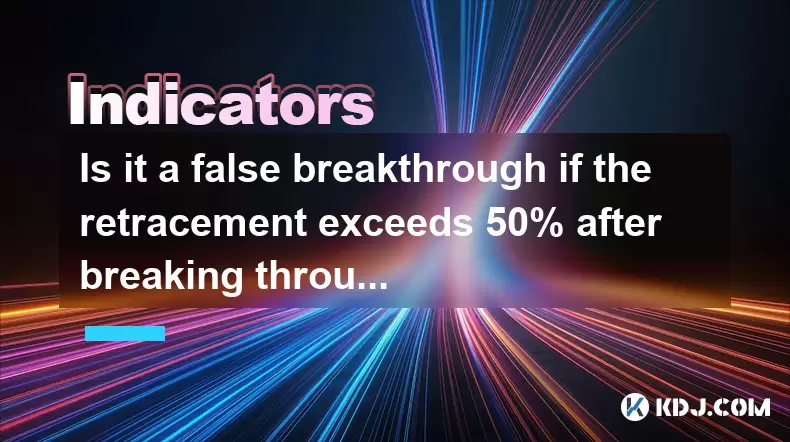
Is it a false breakthrough if the retracement exceeds 50% after breaking through the platform?
Jun 17,2025 at 08:01pm
Understanding Breakouts and Retracements in Cryptocurrency TradingIn cryptocurrency trading, breakouts refer to when the price of an asset moves beyond a defined support or resistance level with increased volume. These events often attract traders looking to capitalize on momentum. However, not all breakouts are valid. A false breakout, also known as a ...
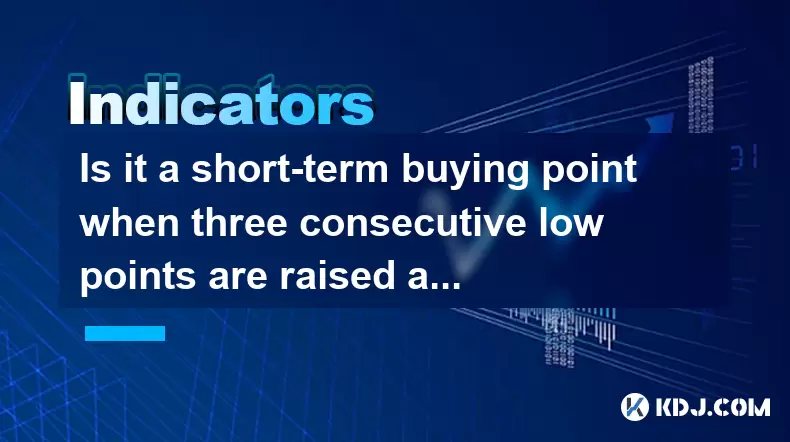
Is it a short-term buying point when three consecutive low points are raised at the 30-minute level?
Jun 17,2025 at 08:14pm
Understanding the Three Consecutive Low Points PatternIn technical analysis, identifying patterns in price movements is essential for making informed trading decisions. One such pattern that traders often observe is when three consecutive low points are raised within a specific timeframe — in this case, the 30-minute chart. This pattern suggests a poten...
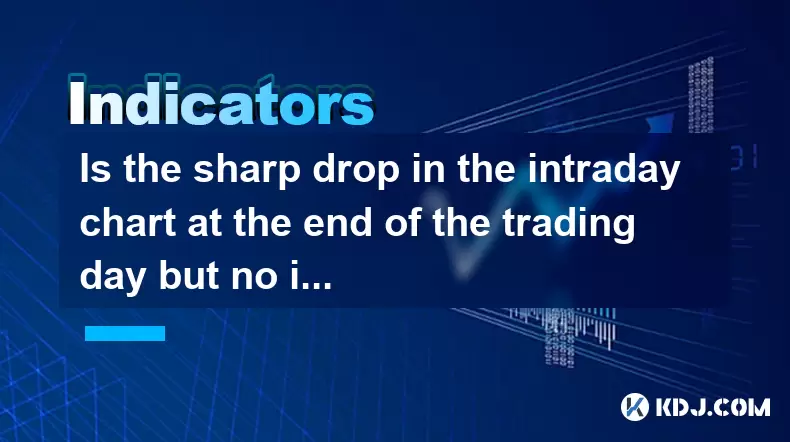
Is the sharp drop in the intraday chart at the end of the trading day but no increase in volume a trap to sell?
Jun 17,2025 at 08:35pm
Understanding the Intraday Chart DynamicsIn cryptocurrency trading, intraday charts are widely used by traders to analyze short-term price movements. These charts display price fluctuations within a single trading day and help traders make informed decisions based on real-time data. One common phenomenon observed is a sharp drop in price near the end of...
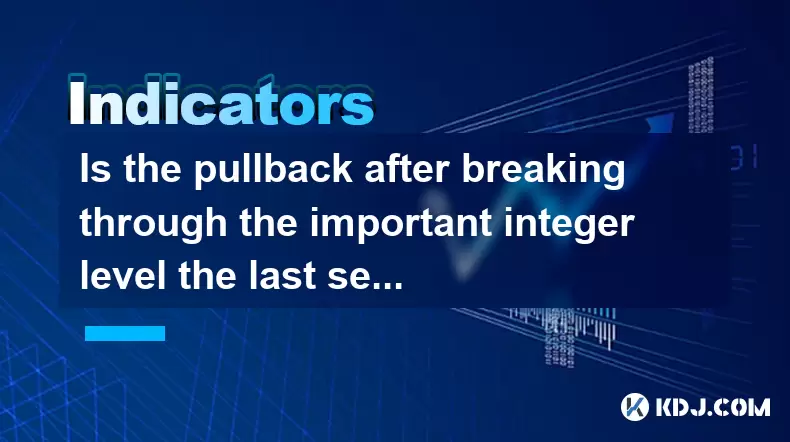
Is the pullback after breaking through the important integer level the last selling point?
Jun 17,2025 at 08:57pm
Understanding Important Integer Levels in Cryptocurrency TradingIn the world of cryptocurrency trading, certain price levels hold significant psychological and technical importance. These are commonly referred to as important integer levels—such as $10,000 for Bitcoin or $1,000 for Ethereum. These levels often act as strong support or resistance zones d...
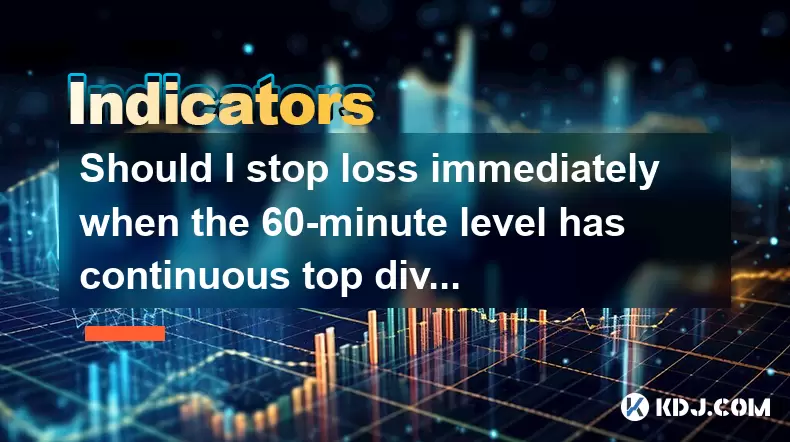
Should I stop loss immediately when the 60-minute level has continuous top divergence?
Jun 17,2025 at 05:28pm
Understanding Top Divergence in the 60-Minute ChartIn cryptocurrency trading, top divergence refers to a technical signal where the price of an asset makes higher highs while the indicator (often RSI or MACD) makes lower lows. This is commonly interpreted as a sign of weakening momentum and potential reversal. When this occurs on the 60-minute chart, it...
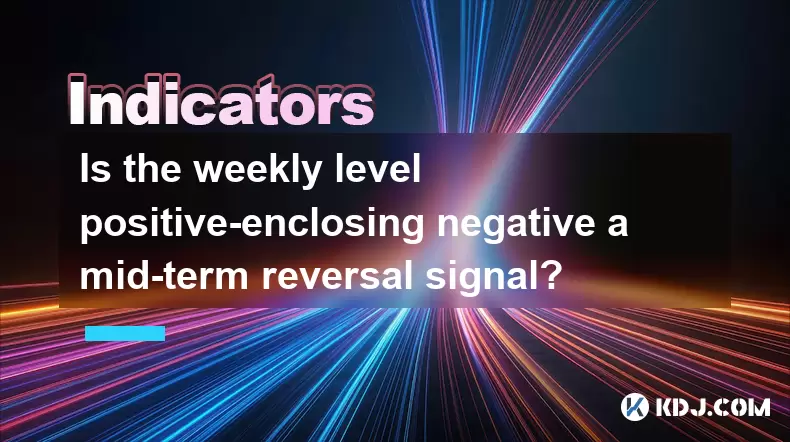
Is the weekly level positive-enclosing negative a mid-term reversal signal?
Jun 17,2025 at 07:42pm
Understanding Weekly Level Positive-Enclosing Negative Candlestick PatternsIn technical analysis, candlestick patterns are often used to predict potential price reversals. One such pattern is the weekly level positive-enclosing negative, which occurs when a weekly candle closes lower than the previous week's close but remains entirely within the range o...

Is it a false breakthrough if the retracement exceeds 50% after breaking through the platform?
Jun 17,2025 at 08:01pm
Understanding Breakouts and Retracements in Cryptocurrency TradingIn cryptocurrency trading, breakouts refer to when the price of an asset moves beyond a defined support or resistance level with increased volume. These events often attract traders looking to capitalize on momentum. However, not all breakouts are valid. A false breakout, also known as a ...

Is it a short-term buying point when three consecutive low points are raised at the 30-minute level?
Jun 17,2025 at 08:14pm
Understanding the Three Consecutive Low Points PatternIn technical analysis, identifying patterns in price movements is essential for making informed trading decisions. One such pattern that traders often observe is when three consecutive low points are raised within a specific timeframe — in this case, the 30-minute chart. This pattern suggests a poten...

Is the sharp drop in the intraday chart at the end of the trading day but no increase in volume a trap to sell?
Jun 17,2025 at 08:35pm
Understanding the Intraday Chart DynamicsIn cryptocurrency trading, intraday charts are widely used by traders to analyze short-term price movements. These charts display price fluctuations within a single trading day and help traders make informed decisions based on real-time data. One common phenomenon observed is a sharp drop in price near the end of...

Is the pullback after breaking through the important integer level the last selling point?
Jun 17,2025 at 08:57pm
Understanding Important Integer Levels in Cryptocurrency TradingIn the world of cryptocurrency trading, certain price levels hold significant psychological and technical importance. These are commonly referred to as important integer levels—such as $10,000 for Bitcoin or $1,000 for Ethereum. These levels often act as strong support or resistance zones d...

Should I stop loss immediately when the 60-minute level has continuous top divergence?
Jun 17,2025 at 05:28pm
Understanding Top Divergence in the 60-Minute ChartIn cryptocurrency trading, top divergence refers to a technical signal where the price of an asset makes higher highs while the indicator (often RSI or MACD) makes lower lows. This is commonly interpreted as a sign of weakening momentum and potential reversal. When this occurs on the 60-minute chart, it...

Is the weekly level positive-enclosing negative a mid-term reversal signal?
Jun 17,2025 at 07:42pm
Understanding Weekly Level Positive-Enclosing Negative Candlestick PatternsIn technical analysis, candlestick patterns are often used to predict potential price reversals. One such pattern is the weekly level positive-enclosing negative, which occurs when a weekly candle closes lower than the previous week's close but remains entirely within the range o...
See all articles

























